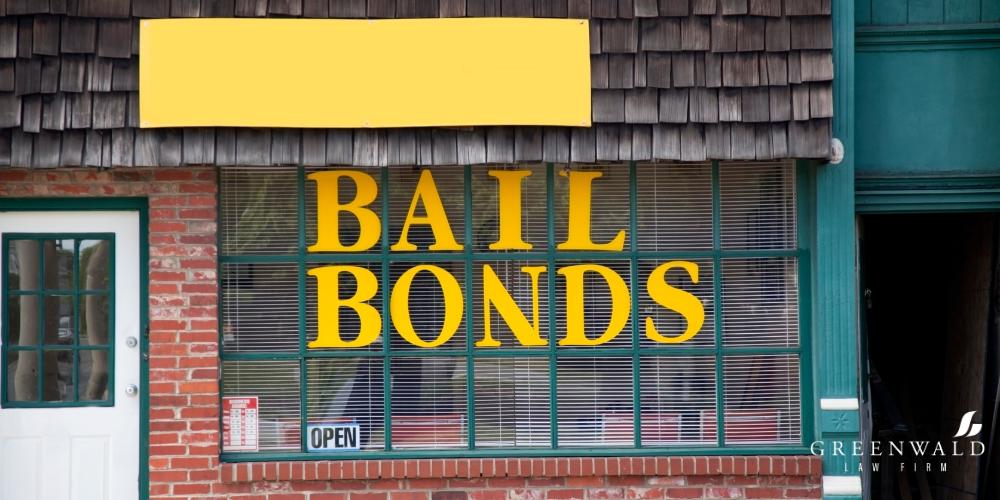Many people have heard of “posting bail” or someone being “bailed out” of jail, but what does this actually mean? How does bail work? What’s the difference between bail and bail bonds?
Understanding Louisiana bail bonds can be tricky, which is why many people turn to criminal defense attorneys like Joseph W. Greenwald to understand the process. If you have been arrested, Shreveport criminal defense attorney Joey Greenwald will walk you through the Louisiana bail bonds process and ensure you understand exactly what you need to do in order to be released from custody.
Call our law firm today at (318) 219-7867 and schedule your free case evaluation with a skilled Louisiana attorney.
The Basics of Bail
Bail is basically a promise that the defendant makes to the state, stating that they will appear in court on the date they are required to in exchange for a sum of money. When a person is arrested, the court often sets a bail amount, which can vary depending on the circumstances of the case.
By paying, or “posting,” the bail, the defendant is released from custody. The state will hold onto the bail money until the defendant appears in court and fulfills their end of the bargain. If the defendant appears in court, they will receive the entire amount of their posted bail, minus any court fees. Even if the defendant is found guilty, if they post bail and attend their mandatory court date, they will still receive the total bail amount at the end of their trial, excluding fees.
If the court date arrives and the defendant does not appear in court, however, the judge will issue an arrest warrant for the defendant and the bail will be forfeited. This means that the defendant will lose their ability to recover their bail, and will be on the hook for any court fees or bond fees.
What is the Difference Between Bail and a Bail Bond?
Many people use the words “bail” and “bond” interchangeably, but they actually refer to two different things. If the defendant is unable to pay the full amount of their bail, they can utilize what is called a bail bond.
The defendant will contact a bonds agency that will pay the entire bail upfront on behalf of the defendant. In exchange, the bail bond company will charge the defendant a non-refundable fee of about 10-15% of the bail amount. In Louisiana, the standard amount is 12%. If the defendant appears in court, they will receive their bail amount back, but they will still have to pay their bonds agency the fees.
For example, if you are arrested and your bail is set for $15,000, you can enter into an agreement with a bail bondsman who will pay the $15,000 on your behalf. If you attend your court dates, you will receive the full bond and will have to pay your bonds agent the agreed-upon fee. So, if the fee were 12% of the bond amount, you would owe them $1,800 in bond fees.
Bail bonds work by ensuring that those who cannot afford to post their own bail are able to be released from custody in the weeks or months leading up to their trial. If the defendant doesn’t appear in court, the bail will be forfeited, and the defendant will be required to pay bond fees.
Louisiana Bail Bond Process
The Louisiana bail bonds process has a number of steps, starting at the initial arrest and ending at the end of the criminal case. Below are the steps someone may go through when bailing out of jail.
- Person is arrested and booked
- Judge sets an amount for the defendant’s bail
- Defendant contacts a bail bond agent and signs a bond contract with them
- Defendant pays bond fees
- Bail bondsman pays the defendant’s bail
- Defendant is released from custody
- Defendant attends their scheduled court date
- Bail is returned to the bail bondsman
Some bail bond companies allow defendants to pay their bond fees back in installments rather than all at once. It’s important to read your contract carefully before signing to ensure you know what you’re agreeing to. A skilled attorney can help guide you through the process and read through your contract, so that you can fully understand the terms and conditions.
Factors Determining Bail Amounts in Louisiana
A person’s bail amount isn’t set to an arbitrary amount. Rather, it’s based on several factors, all of which the judge will consider before setting the amount. Some of these factors include:
- Severity of the crime
- Criminal history
- Flight risk
- Risk to public safety
- Probation or parole status
- Amount of evidence against the defendant
A higher bail amount can help ensure that those accused of more serious crimes have a lower likelihood of bonding out. It also increases their likelihood of attending court hearings. Even if someone can afford post bail themselves, they almost certainly will want that money back after their case is concluded, especially if the bail amount is very high.
Types of Bail Bonds Available in Louisiana
Someone who has been arrested on suspicion of a crime can utilize a number of different kinds of bail bonds in Louisiana, some of which involve bail bondsmen and some that do not.
Cash Bond
If someone happens to have enough cash on them at the time of their arrest, they can post their bail in cash and be released from custody right after being booked. If they don’t have enough money to cover their bail, a third party like a friend or family member can also pay the cash bail on the defendant’s behalf. This method would not require a bail bondsman.
Surety Bond
A surety bond is a bond that is paid on behalf of the defendant by a third-party entity in exchange for a fine or fee. These can take the form of a commercial surety bond or a personal surety bond.
Commercial surety bonds are often paid by bond agencies and are paid in exchange for 12% of the total bail. A defendant will sign an agreement with a bail agent who will post the entirety of the bail on the defendant’s behalf.
A personal surety bond undertaking (PSBU) is where a third party pays the bail. A court hearing is conducted to ensure the third party is financially able to pay the bail, and, if approved, the third party can post the entire amount of the defendant’s bail. The third-party may be required to pay a small fee to the court in order to file the PSBU, which is usually $200 in the state of Louisiana.
Property Bond
A property bond is a bond where the defendant or a third party uses property to cover the cost of the bail. If the property is in Louisiana, it can be used as bond collateral. The defendant will need to provide the state with the property title so that the equity on the mortgage can be calculated. If the equity is equal to or exceeds the amount of the bail, it can be used to pay the bail.
Personal Recognizance (PR) Bond or Own Recognizance (OR) Bond
A personal recognizance bond is a bond where the defendant agrees to appear for their court date without paying any bail. This is usually granted to those who are not deemed to be a danger to society or who have certain ties to the community. The judge will still have a bail set, but the defendant will not be required to pay it if they attend all necessary court appearances.
While this may seem like the best-case scenario, it is usually only granted in very specific circumstances and can also take longer to process than a surety bond or cash bond.
Additionally, there may be hidden fees or consequences that the defendant would have to pay or participate in if they want to avoid paying their bail. For example, if someone is charged with a petty drug crime, they may be released on a PR bond in exchange for enrolling in, paying for, and participating in a court-mandated drug diversion program
The Role of a Bail Bondsman
A bail bondsman plays a vital role in the criminal justice system and can help defendants as well as the court, depending on the circumstances. A bail bonds agent will pay a defendant’s bail in exchange for fees. The defendant will pay fees in accordance with their contract and will be released from custody.
Additionally, if the defendant fails to make their court appearance, the bail bondsman can arrest them and ensure they follow through with their court proceedings. It’s important to note that bail bondsmen can only arrest defendants after failing to appear in court.
As licensed professionals, bail bondsmen operate under strict regulations, which ensure they are not operating beyond the scope of their position. A bail bondsman’s services can greatly benefit those in custody, but can also help the state from using their own law enforcement resources to retrieve those who fail to appear in court.
Understanding Bail Conditions and Restrictions in Criminal Cases
In addition to the baseline bail amount, the court may outline additional conditions and restrictions in order to ensure the defendant complies with the judicial process. Common bail conditions include restrictions on travel, contact, alcohol and drug use, and employment.
Courts may impose no-contact orders, especially in cases involving violence or harassment, prohibiting the defendant from contacting the victim or witnesses. They may also place the defendant under house arrest or require them to remain within certain geographical limits.
In some cases, the court might require employment, abstinence from alcohol or drugs, and random drug testing. Regular check-ins with law enforcement or a bail agent are often mandated to monitor the defendant’s compliance.
Violating any of these conditions can result in forfeiture of the bail and immediate return to custody, even if the defendant appears at their various court dates. Understanding these conditions is crucial to avoiding additional legal consequences.
The Consequences of Violating Bail Terms in Louisiana
Violating bail terms in Louisiana can have serious repercussions. If a defendant fails to adhere to the conditions set by the court, the judge may issue a warrant for their arrest and may have their bail revoked. If the defendant utilized a bail bondsman, the bondsman may employ a bounty hunter to locate and arrest the defendant.
Additionally, violating bail terms can lead to additional charges or penalties, including extending the terms of the bail, increasing the bail amount, or revoking bail entirely, resulting in the defendant being held in custody until trial.
Violating bail terms can negatively impact the outcome of the defendant’s case since it reflects poorly on their credibility and willingness to comply with Louisiana law. Therefore, understanding and strictly adhering to bail terms is crucial for defendants in Louisiana.
The Role of a Criminal Defense Attorney in the Bail Process
Criminal defense attorneys are not just a critical part of the legal system, they also play a vital role in the bail process in Louisiana. From the outset, they provide legal representation and advice, helping the defendant gain a better understanding of the charges and the bail process.
During the bail hearing, the attorney can argue on behalf of their client, aiming to secure the lowest possible bail amount and favorable conditions. They can present factors such as the defendant’s ties to the community, employment status, family responsibilities, and lack of criminal history to persuade the court of the defendant’s reliability and low flight risk.
Additionally, a defense attorney can negotiate bail terms and seek alternatives to cash bail, like a PR bond. They also guide the defendant in understanding and adhering to bail conditions, ensuring they don’t inadvertently violate any terms.
In cases where bail terms are violated, the attorney can advocate for their client in court and can potentially prevent their bail from being revoked or can negotiate to have it revised and made more manageable.
A criminal defense attorney’s experience and negotiation skills are key in navigating the complex legal system and achieving a favorable outcome. That’s why it’s important that those who have been arrested for a crime in Louisiana find a skilled Shreveport criminal defense attorney like Joseph W. Greenwald to take on their case.
Beyond Bail: The Next Steps in Your Shreveport Criminal Defense Journey
Getting released from police custody takes more than just posting bail–it can require expert legal guidance from a licensed attorney like Joey Greenwald. With a deep understanding of how Louisiana bail bonds work and how the Louisiana criminal justice system operates, he can ensure you understand the process and receive a fair bail amount or bond agreement.
If you have been accused of a crime, contact the Greenwald Law Firm so that we can discuss your case. Call us at (318) 219-7867 or contact us online and schedule your free consultation with Attorney Greenwald today.



